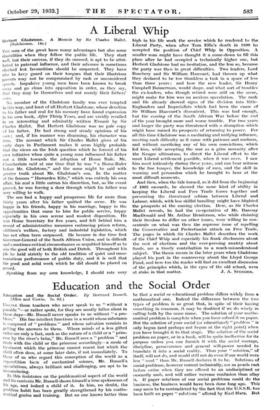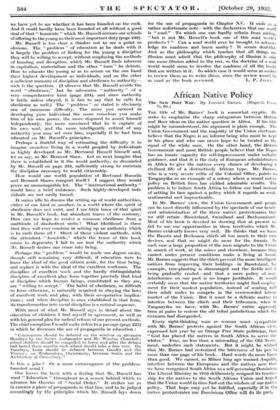Education and the Social Order
Education and the Social Order. By Bertrand Russell. (Allen and Unwin. 78. 6d.)
Muss those teachers who never speak to us " without a parable "—or rather spoke, for they are mostly fallen silent in these days—Mr. Russell never speaks to us without " a pro- blem." His fine intellect functions in a world whose substance is composed of " problems " and whose salvation consists in getting the answers to them. Where minds of a less gifted order see only a fact, such as the nature of a child or a " prim- rose by the river's brim," Mr. Russell sees a " problem " and deals with the child or the primrose accordingly—a mode of treatment which the primrose cannot resent but which the child often does, at some later date, if not immediately. To those of us who regard this conception of the world as a superstition born of mechanical science, Mr. Russell's speculations, always brilliant and challenging, are apt to be unconvincing.
In this insistence on the problematical aspect of the world and its contents Mr. Russell shows himself a true spokesman of his age, and indeed a child of it. In him, no doubt, the Problem habit has been greatly strengthened by his mathe- matical genius and training. But no one knows better than
he that a social or educational problem differs widely from a mathematical one. Indeed the difference between the two types of problem is so great that, in spite of their having something in common, it may be doubted if we do wisely in calling both by the same name. The solution of your nuithe- poetical problem is complete when you have solved it on paper. But the solution of your social (or educaticlaal) " problem " is only begun (and perhaps not begun at the right point) when you have brought it to that stage. The solution of the social problem on paper, or in a book, will be quite ineffective for its purpose unless you can furnish it with the social courage, discipline, perseverance and general will-power needed to translate it into a social reality. Thus your " solution," of itself, will not do, and would still not do even if our world were less " mad " than Mr. Russell declares it to be. Solutions of social problems, however correct technically, are as pearls cast before swine when they arc offered to an undisciplined or cowardly mob, and will rather necrease confusion than allay it. If paper solutions of our social problems could do the business, the business would have been done long ago. This may seem to be contradicted by the fact that the U.S.S.R. has been built on paper " solutions " offered by Karl Marx. But
we have yet to see whether it has been founded on the. rock.
And it could hardly have been founded at all without a good deal of that " homicide " which Mr. Russell accuses our-schools
of offering to the young as their most important duty (page 249). Mr. Russell is too clear a thinker not to see a point so
obvious. The " problem " of education as he deals with it is largely the problem of finding for the young a discipline
they will be willing to accept, without employing the methods of humbug and deception, which Mr. Russell finds inherent
in capitalism, materialism and the other " isms " he detests. How to educate the young so as to secure on the one hand their highest deVelopment as individuals, and on the other a sufficient measure of discipline and obedience to authority— such is the question. (I observe that Mr. Russell avoids the word " obedience," but he advocates " authority " of a Very comprehensive kind (page 234), and since authority is futile unless obeyed, it is fair to say that he calls for obedience as well.) The " problem " so stated is obviously one of enormous difficulty. The more you succeed in
developing your individual the more conscious you make him of his own power, the more disposed to assert himself independently, the more convinced that he is captain of his own soul, and the more intelligently critical of any authority you may set over him, especially if he had been educated on Mr. Russell's principles.
Perhaps a fruitful way of estimating the difficulty is to imagine ourselves living in a world peopled by individuals as highly developed as Mr. Bertrand Russell himself and, let us say, as Mr. Bernard Shaw. Let us next imagine that there is established in it the world authority, as demanded by Mr. Russell on page 234, sufficiently strong to maintain the discipline necessary to world citizenship.
How would our world population, of Bertrand Russells and Bernard Shaws comport itself ? I suggest they would prove an unmanageable lot. The " international authority " would have a brief existence. Such highly-developed indi- viduals are not easily tamed.
It seems idle to discuss the setting up of world authorities, either of one kind or another, in a world where the spirit of obedience does not exist, and I see little trace of that spirit in Mr. Russell's book, but abundant traces of the contrary. How can we hope to evolve a common obedience from a multitude of disobedient units ? What likelihood is there that they will ever combine in setting up an authority which is to curb them all ? Short of those violent methods, with the attendant " homicide," which the tenor of this book seems to deprecate, I fail to see how the authority which Mr. Russell desires can come into being.
Perhaps the " problem " would be made one degree easier, though still remaining very difficult, if education were to leave the ideal of the good citizen aside, for the time being, and replice it with the ideal of the excellent workman. The discipline of excellent work and the hardly distinguishable discipline of excellent play form together precisely that kind of discipline which human beings, constituted as they are, are " willing to accept." The habit of obedience, so difficult
to form otherwise, is naturally acquired in obeying the laws of excellent work and play, with their co-operative implica- tions ; and when discipline is once established' in that form, its transformationinto social discipline is a natural sequence.
With most of what Mr. Russell says in detail about the education of children I find, myself in agreenient, as well as with his general plea for radical reform of our present methods. The chief exception I would make refers to a passage (page 225) in which he discusses the use of propaganda in education :
" Communism should be debated on the wireless on alternate Mondays by tho Soviet Ambassador and Mr. Winston Churchill ; school children should be compelled to listen and after the debate had lasted throe months each school should take a free vote. On Tuesdays, India should be' debated between._ Gandhi and the Viceroy ; on .Wednesdays, Christianity, between Stalin and the Archbishop of Canterbury."
Is this a joke ? Or a 'mere extravagance of the problem- haunted mind ?
One leaves the book with a feeling that Mr. Russell has used "Education " throughout as a screen behind which to advance his theories of " Social Order." It strikes me as in essence a piece of propaganda in that line, and to be judged accordingly by the principles which Mr. Russell lays down for the use of propaganda in Chapter XV. It ends on a rather unfortunnte note—with the declaration that our world is " To which one can hardly refrain from adding, " but is not Mr. Russell's book one of this -Mad
products ? " Can a mad world ever be brought to iicknow. ledge its madness and learn sanity ? It seems doubtful. Just as the philosophy which teaches that all things are illusion must admit that the philosophy of illusion is only one more illusion added to the rest, so the doctrine of a mad world would seem to involve the madness of all the books that are written in it. In which case it would-seem as useless to,-review them as to write them, since the review would be













































 Previous page
Previous page